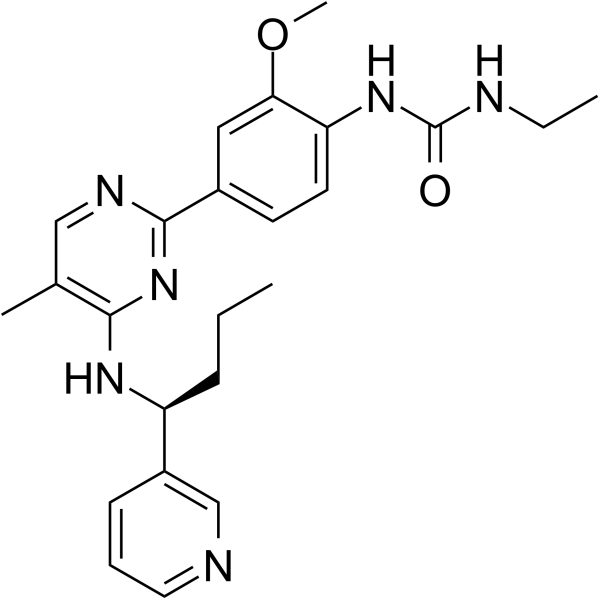上海金畔生物科技有限公司为生命科学和医药研发人员提供生物活性分子抑制剂、激动剂、特异性抑制剂、化合物库、重组蛋白,专注于信号通路和疾病研究领域。
Lexibulin (Synonyms: CYT-997) 纯度: 98.08%
Lexibulin (CYT-997) 是微管蛋白聚集强效抑制剂,对多种癌细胞的 IC50 值为 10-100n M,体外体内具有高效的细胞毒性和血管增生阻断作用。Lexibulin 可诱导细胞凋亡 (apoptosis),并诱导 GC 细胞中的线粒体 ROS 生成。

Lexibulin Chemical Structure
CAS No. : 917111-44-5
| 规格 | 价格 | 是否有货 | 数量 |
|---|---|---|---|
| 10 mM * 1 mL in DMSO | ¥1045 | In-stock | |
| 5 mg | ¥950 | In-stock | |
| 10 mg | ¥1700 | In-stock | |
| 50 mg | ¥6100 | In-stock | |
| 100 mg | 询价 | ||
| 200 mg | 询价 |
* Please select Quantity before adding items.
Lexibulin 相关产品
•相关化合物库:
- Covalent Screening Library Plus
- Drug Repurposing Compound Library Plus
- Clinical Compound Library Plus
- Bioactive Compound Library Plus
- Apoptosis Compound Library
- Cell Cycle/DNA Damage Compound Library
- Immunology/Inflammation Compound Library
- Metabolism/Protease Compound Library
- NF-κB Signaling Compound Library
- Stem Cell Signaling Compound Library
- Anti-Cancer Compound Library
- Clinical Compound Library
- Anti-Aging Compound Library
- Drug Repurposing Compound Library
- Covalent Screening Library
- Antioxidants Compound Library
- Oxygen Sensing Compound Library
- Ferroptosis Compound Library
- Pyroptosis Compound Library
- Cytoskeleton Compound Library
- Orally Active Compound Library
- Anti-Lung Cancer Compound Library
- Anti-Blood Cancer Compound Library
- Mitochondria-Targeted Compound Library
- Targeted Diversity Library
| 生物活性 |
Lexibulin (CYT-997) is a potent and orally active tubulin polymerisation inhibitor with IC50s of 10-100 nM in cancer cell lines; with potent cytotoxic and vascular disrupting activity in vitro and in vivo[1][2]. Lexibulin induces cell apoptosis and induces mitochondrial ROS generation in GC cells[3]. |
IC50 & Target |
IC50 value: 10-100 nM(cell assay)[1] |
||||||||||||||
|---|---|---|---|---|---|---|---|---|---|---|---|---|---|---|---|---|---|
| 体外研究 (In Vitro) |
Lexibulin (CYT-997) prevents the in vitro polymerization of tubulin with an IC50 of ~3 μmol/L (compared with the half-maximal inhibitory concentration of 2 μmol/L for colchicine under identical conditions) as determined using the conventional turbidimetric assay for tubulin polymerization. Lexibulin is also capable of reversibly disrupting the microtubule network in cells, visualized using fluorescence microscopy. Thus, treatment of A549 cells with Lexibulin (1 μM) lead to the rapid reorganization of microtubules, including the destruction of the existing microtubule network and accumulation of tubulin in plaques within the cytoplasm of some cells. After 24 hours, major alterations in cell morphology are evident, including loss of adhesion and cell rounding. The effect of 1 hour of treatment with Lexibulin is reversible and cells rapidly recovered their normal microtubule architecture. Taken together, the data indicates that Lexibulin belongs to the class of anticancer agents that disrupt, rather than stabilize, tubulin-containing structures. Although vehicle-treated cells show 15% and 19% in G2-M phase at 15 and 24 hours (respectively), cells treated with Lexibulin (1 μM) had 38% and 43% of cells in G2-M at the same time points. Furthermore, at 24 hours post-Lexibulin treatment, only 66% of total cells are in the G1, S, and G2-M phases, which suggests that cells blocked at the G2-M boundary do not exit back to G1, as in the normal cell cycle, but most likely are driven towards apoptosis and cell death[1]. Consistent with the disruption of cellular tubulin, Lexibulin potently inhibits proliferation, induces cell cycle arrest and most importantly apoptosis of both human myeloma cell lines (HMCLs) and primary MM cells[2]. 上海金畔生物科技有限公司 has not independently confirmed the accuracy of these methods. They are for reference only. |
||||||||||||||||
| 体内研究 (In Vivo) |
iIn a xenograft model using the human prostate cancer cell line PC3, oral dosing of Lexibulin (CYT-997) is initiated 13 days after cell implantation by which time palpable tumors were evident. A dose-dependent inhibition of tumor growth was apparent with Lexibulin (CYT-997), which at the highest dose was equivalent to parenterally administered paclitaxel. A single dose of Lexibulin (CYT-997) (7.5 mg/kg i.p.) clearly decreased blood flow in liver metastases, and a significant reduction in blood flow was present 6 hours postdose[1]. Lexibulin (CYT-997) treatment (15 mg/kg/day) significantly prolongs the survival in a murine model of aggressive systemic myelomatosis[2]. 上海金畔生物科技有限公司 has not independently confirmed the accuracy of these methods. They are for reference only. |
||||||||||||||||
| Clinical Trial |
|
||||||||||||||||
| 分子量 |
434.53 |
||||||||||||||||
| Formula |
C24H30N6O2 |
||||||||||||||||
| CAS 号 |
917111-44-5 |
||||||||||||||||
| 运输条件 |
Room temperature in continental US; may vary elsewhere. |
||||||||||||||||
| 储存方式 |
|
||||||||||||||||
| 溶解性数据 |
In Vitro:
DMSO : ≥ 100 mg/mL (230.13 mM) * “≥” means soluble, but saturation unknown. 配制储备液
*
请根据产品在不同溶剂中的溶解度选择合适的溶剂配制储备液;一旦配成溶液,请分装保存,避免反复冻融造成的产品失效。 In Vivo:
请根据您的实验动物和给药方式选择适当的溶解方案。以下溶解方案都请先按照 In Vitro 方式配制澄清的储备液,再依次添加助溶剂: ——为保证实验结果的可靠性,澄清的储备液可以根据储存条件,适当保存;体内实验的工作液,建议您现用现配,当天使用; 以下溶剂前显示的百
|
||||||||||||||||
| 参考文献 |
|
所有产品仅用作科学研究或药证申报,我们不为任何个人用途提供产品和服务
